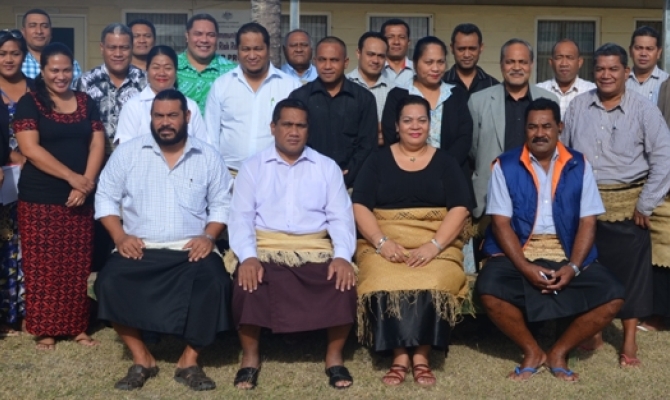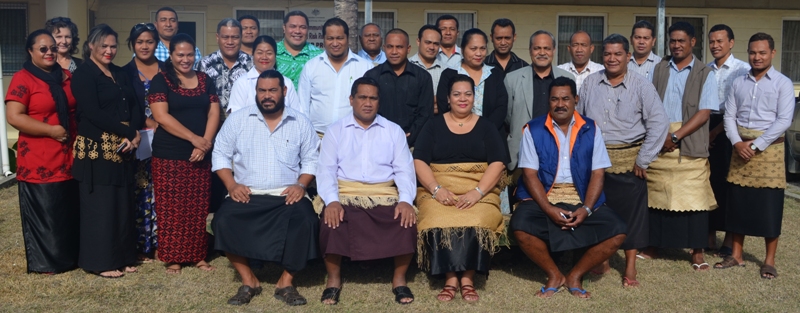
Climate Change Resilience
20 May, 2015, Nukualofa, Tonga - Understanding the role of the Meteorological Service and the terminology used when sharing information is at the core of training that opened in Tonga today.
With the changing weather patterns and climate, the role of the weather in the day to day activities of Pacific island communities is crucial. This is the basis for work underway to help Met Services across the region to become better communicators, and for communities to be better informed.

"We now have Meteorological and Disaster information we can use to plan our development and day to day activities, which we did not have before," said Mr. Paula Ma'u, Chief Executive Officer of the Ministry of Meteorology, Energy, Information, Disaster Management, Environment and Climate Change in Tonga.
"However, the new science and information provided by the Met Service is useless if we are not able to deliver it in an accurate and timely manner to our communities and our users. Media plays a key role in this delivery service."
The training across 14 different Pacific island countries is part of the Finland-Pacific project on 'reduced vulnerability of Pacific Island communities' livelihoods to the effects of climate change' that is implemented by the Secretariat of the Pacific Regional Environment Programme (SPREP) and funded by the Government of Finland.
The three day training brings together members of the community from Mo'unga'one and Ha'apai, the Tonga Red Cross, Tonga Meteorological Service and other Government Ministries, with members of the local media to help forge a way forward to ensure the met information shared is understood by communities.
"At SPREP we fully understand the important role of communication information clearly, especially when the information can help build the resilience of our island communities. We are grateful to the Government of Finland and our island member countries for their support in implementing the different phases of this project, for which communicating information clearly is a key component," said Dr. Pelesikoti.
"We are also thankful to the Government of Tonga and the Mo'unga'one community and Ha'apai for their support and participation with this activity."
In 2014 Cyclone Ian, a category 5 Tropical Cyclone passed over Tonga in January leaving behind USD 120 million in damages, one fatality and the complete destruction of 564 homes on the island of Ha'apai.
While feedback from communities indicate the Tonga Meteorological Service was successful in sharing climate information, forecasting the cyclone and distributing warnings to residents, the Tonga Met Service cites this as one example that propels them to strengthen their communication skills.
"We want to do what we can to ensure that we convey weather, climate and response information in a manner communities understand. Over this training we are going to look at language used and how to share information in an approach that communities are comfortable with and are able to respond to properly," said Mr. Ofa Fa'anunu, Director of the Tonga Meteorological Service.
Activities during the training will address use of terminology, strengthening media skills and a panel discussion to hear the different perspectives when it comes to sharing and understanding the best ways to disseminate information. After the training it is planned that a Media Guide will be provided to the Tonga Meteorological Service to assist with future media and communications activities.
The workshop titled – "The Role of the National Meteorological Services and the Media in Providing Correct, Timely and Meaningful Weather and Climate Information to the Community and all Users" is held from 20 – 22 May in Tonga. This is the fifth country to undergo the training – the Cook Islands, Niue, Samoa and Tuvalu having completed theirs.
ENDS...
With the changing weather patterns and climate, the role of the weather in the day to day activities of Pacific island communities is crucial. This is the basis for work underway to help Met Services across the region to become better communicators, and for communities to be better informed.

"We now have Meteorological and Disaster information we can use to plan our development and day to day activities, which we did not have before," said Mr. Paula Ma'u, Chief Executive Officer of the Ministry of Meteorology, Energy, Information, Disaster Management, Environment and Climate Change in Tonga.
"However, the new science and information provided by the Met Service is useless if we are not able to deliver it in an accurate and timely manner to our communities and our users. Media plays a key role in this delivery service."
The training across 14 different Pacific island countries is part of the Finland-Pacific project on 'reduced vulnerability of Pacific Island communities' livelihoods to the effects of climate change' that is implemented by the Secretariat of the Pacific Regional Environment Programme (SPREP) and funded by the Government of Finland.
The three day training brings together members of the community from Mo'unga'one and Ha'apai, the Tonga Red Cross, Tonga Meteorological Service and other Government Ministries, with members of the local media to help forge a way forward to ensure the met information shared is understood by communities.
"At SPREP we fully understand the important role of communication information clearly, especially when the information can help build the resilience of our island communities. We are grateful to the Government of Finland and our island member countries for their support in implementing the different phases of this project, for which communicating information clearly is a key component," said Dr. Pelesikoti.
"We are also thankful to the Government of Tonga and the Mo'unga'one community and Ha'apai for their support and participation with this activity."
In 2014 Cyclone Ian, a category 5 Tropical Cyclone passed over Tonga in January leaving behind USD 120 million in damages, one fatality and the complete destruction of 564 homes on the island of Ha'apai.
While feedback from communities indicate the Tonga Meteorological Service was successful in sharing climate information, forecasting the cyclone and distributing warnings to residents, the Tonga Met Service cites this as one example that propels them to strengthen their communication skills.
"We want to do what we can to ensure that we convey weather, climate and response information in a manner communities understand. Over this training we are going to look at language used and how to share information in an approach that communities are comfortable with and are able to respond to properly," said Mr. Ofa Fa'anunu, Director of the Tonga Meteorological Service.
Activities during the training will address use of terminology, strengthening media skills and a panel discussion to hear the different perspectives when it comes to sharing and understanding the best ways to disseminate information. After the training it is planned that a Media Guide will be provided to the Tonga Meteorological Service to assist with future media and communications activities.
The workshop titled – "The Role of the National Meteorological Services and the Media in Providing Correct, Timely and Meaningful Weather and Climate Information to the Community and all Users" is held from 20 – 22 May in Tonga. This is the fifth country to undergo the training – the Cook Islands, Niue, Samoa and Tuvalu having completed theirs.
ENDS...